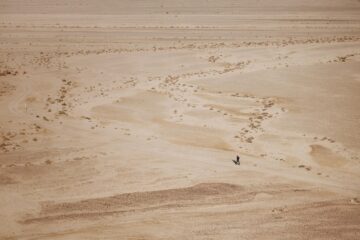On 23 February 1991, we were all very focused and ready to “get on with it.” For the previous 7 days we had conducted destructive artillery raids on the Iraqi 26th Infantry Division that sat in front of us blocking our way into Iraq. They would not obstruct us much longer. That day we would conduct our final set of artillery raids based on the intelligence we received and previous battle damage assessments we had conducted.
Some of those assessments were accomplished by a British unmanned aerial vehicle (UAV) that the 1st (UK) Armored Division had brought with them. We had no such capability in the 1st Infantry Division Artillery (DIVARTY), so the equipment of our British allies was very helpful. UAVs were the way of the future. Indeed, even today we have seen the important role of UAV’s in the Ukrainian war, not only to conduct reconnaissance, but also as attack platforms to destroy enemy vehicles and troops in the open.
Nevertheless, 32 years ago today we readied ourselves for the following day when we would commence our ground assault into Iraq to deliver a final blow to liberate the beleaguered people of Kuwait. We conducted “back briefs” to our commander to ensure all of us understood what we would do, when, and how. Part of that “how” was ensuring we had enough ammunition on the ground and to fire a huge preparation we would unleash on 24 February 1991. It would need to be decisive to guarantee the success of our maneuver forces who were poised to tear into Iraq and knife through both the Iraqi infantry, and the famed Republican Guards dug in and awaiting our arrival near the Kuwaiti border. A fight was ahead, and we were quite busy preparing ourselves for that day, just hours away.
“Big Red One” soldiers and their artillerymen were like thoroughbred horses anxiously awaiting the starting gate to fling open, when we would deliver devastating preparatory fires to support that ground invasion. As an additional task for me that day, my commander Colonel Mike Dodson had me accompany a CNN reporter to the field so the press could get a taste of what we were accomplishing during our last day of 8 days of artillery raids. Here’s what I wrote in Desert Redleg: Artillery Warfare in the First Gulf War.
“Dodson assigned another reporter to me that morning, a CNN correspondent, to view the final artillery raid. He interviewed me with the 1–27 FA (MLRS) firing a huge raid mission in the background. Quite impressed, he asked me what I thought about how Saddam Hussein would respond to these raids. I said, “There’s no hiding from artillery” and that if they were smart, “this will wake them up, so they can smell the coffee and go home.” Then I added, “We’re just going to duke it out.” And that’s precisely what we did through the raids.”
I truly hope that you will read about this war in Desert Redleg. Why? It’s more important than buying a book. It’s important to understand the lessons of warfare, particularly as America retools its warfighting capabilities after years of being tied down in counter insurgency wars in Iraq and Afghanistan. We need to be ready to fight conventionally. And we’re not looking for a fight, but we are looking to be ready for one.
We learned many lessons in the First Gulf War, not the least of which was to bring overwhelming strength to the fight. We are also learning new lessons as Ukrainians employ our superior combat systems with their manpower, not ours, to fight an enemy who should be defeated. This has come at a huge financial cost to America, and we need to recover from that as well as be sure our forces are ready to do our constitutional duty when Congress and the President call upon us to do so.
Understanding the lessons of the past, as well as those playing out before us now in Ukraine, is vital if we are to learn and prepare for the inevitable day when we must fight.
To that end, I will be delivering a lecture to the First Division Museum in Wheaton, Illinois this coming Thursday 2 March, 7:00 PM to 8:00 PM central time. You can also view it online by registering at no cost at this link. Additionally, you can submit questions to me in advance via the link. So, please sign up and learn about this war. Citizens of all backgrounds need to understand what we did so we can make clear to our leaders why we must be able to do so again if called upon.
I hope you will join the lecture when I focus on these important lessons!



0 Comments